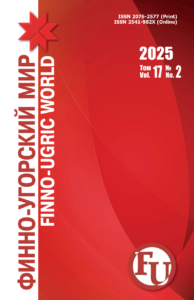Original article
DOI: 10.15507/2076-2577.013.2021.04.369-378
Medical assistance, maternal and child welfare service of the Udmurt ASSR during the post-war period (1945–1950)
Natalia N. Bushmeleva
Lev L. Shubin
Izhevsk State Medical Academy,
Izhevsk, Russia
Introduction. The article examines the state of protection of mothers and children in the Udmurt Autonomous Soviet Socialist Republic in the post-war period of 1945–1950. The article analyzes the quality of medical care and services for the protection of mothers and children, the equipment of medical institutions with medical personnel and the staffing of departments with beds and the necessary equipment for providing medical care to children and mothers.
Materials and Methods. The work used the data from the central Republican archive of the Udmurt ASSR. It carried out a market analysis on the state and development of the network of obstetric and gynecological care. The materials contained in research that give an idea of the problem under consideration, as well as legal documents have been investigated and summarized.
Results and Discussion. In this period under review, a network of antenatal clinics, maternity hospitals, obstetric and gynecological departments is being created. The number of beds for pregnant women and women in labor increased. A specialized department of pregnancy pathology was organized. The rates of maternal mortality, stillbirth and neonatal mortality have dropped significantly. An exchange card has been introduced in hospitals. With the creation of a methodological office, work began on the development of programs for preschool education, cluster and regional conferences began to be held. The conferences dealt with deaths, with special attention paid to issues of late hospitalization. Since 1949, the method of serving children according to the “single pediatrician” system were practiced.
Conclusion. Protecting the interests of mother and child, the Udmurt Autonomous Soviet Socialist Republic in the postwar years provided great assistance to pregnant women and mothers, fulfilling the Decree of the Presidium of the Supreme Council of July 8, 1944. Employees of the Childhood Department, doctors of Izhevsk and employees of the department childhood diseases of the Izhevsk Medical Institute traveled to the regions of the Republic to provide practical assistance and control the work on childhood in the field.
Keywords: Udmurtia, protection of motherhood and childhood, post-war years, children’s hospitals, antenatal clinics, maternity hospitals, obstetric and gynecological departments
For citation: Bushmeleva NN, Shubin LL. Medical assistance, maternal and child welfare service of the Udmurt ASSR during the post-war period (1945–1950). Finno-ugorskii mir = Finno-Ugric World. 2021;13;4:369–378. (In Russ.). DOI: 10.15507/2076-2577.013.2021.04.369-378.
Information about the authors
N. N. Bushmeleva – Doctor of Medicine, Associate Professor, Department of Obstetrics and Gynecology, Izhevsk State Medical Academy, nnbush17@mail.ru, https://orcid.org/0000-0001-7007-226X
L. L. Shubin – Candidate Sc. {Medicine}, Associate Professor, Department of Public Health and Health Care, Izhevsk State Medical Academy, leva-shubin@mail.ru, https://orcid.org/0000-0002-5759-7333






















